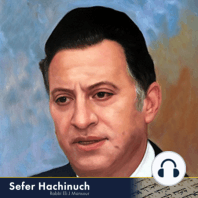20 min listen
Misva #437: Not to Erase G-d’s Name and Not to Destroy Sacred Objects
FromSefer Hachinuch
ratings:
Length:
20 minutes
Released:
Apr 20, 2023
Format:
Podcast episode
Description
The Torah in Parashat Re’eh commands us to destroy objects of pagan worship, and then warns, “Lo Ta’asun Ken L’Hashem Elokechem” – “Do not do such to Hashem your G-d” (Debarim 12:4). This establishes a Biblical command forbidding any sort of destruction of sacred property. That which is required to be done to objects of idol worship may not be done to sacred property such as the written Name of Hashem, synagogues, the Bet Ha’mikdash, the altar, or any other sacred object. The reason behind this command, quite obviously, is that we are to treat matters of sanctity with awe and reverence, and so we are not allowed to destroy them in any way. The Sages identified seven Names of Hashem that this Biblical command forbids erasing. These are: Havaya (spelled Yod, Heh, Vav, and Heh); Adanut (spelled Alef, Dalet, Nun, and Yod); Kel (spelled Alef and Lamed); Elo-ah (spelled Alef, Lamed, Vav, and Heh); Elokim (spelled Alef, Lamed, Vav, Heh, Yod, and Mem Sofit); Sha-ddai (spelled Shin, Dalet, and Yod); and Seva-ot (spelled Sadi, Bet, Alef, Vav, and Tav). If one of these Names is written with a prefix, such as “L’Hashem” (“for Hashem”), then the prefix is not endowed with sanctity, and may be erased. Since it was written before the Name, it is not considered sacred. Thus, the Lamed in the word “L’Hashem” may be erased. If, however, the Name has a suffix, such as in the word “Elokechem” (“Your G-d”), the additional letters may not be erased. Since they are added to the Name after the Name is already written, they are endowed with sanctity and thus forbidden to be erased just like the Name itself. This applies also to the word “Elokecha” (“your G-d”); the Chaf Sofit at the end of the word may not be erased, because it was added to a Name of G-d. If a person began writing Hashem’s Name, but has not completed the writing, he may erase the letters that he has written. Thus, for example, if a person intended to write the Name “Sha-ddai,” but after writing the letters Shin and Dalet, before writing the Yod, he changed his mind, he may erase the Shin and Dalet. This prohibition does not include descriptive references to G-d, such as “Rahum” (Merciful One”), “Hanun” (“Gracious One”), “Gadol” (“Great One”), “Gibor” (“Mighty One”), and “Nora” (“Awesome One”). Although they refer to Hashem, these Names may be erased if there is a need. If a heretic, who does not accept the authority of the Torah She’be’al Peh (oral Halachic tradition), writes a Name of G-d, this Name is not subject to the prohibition of “Lo Ta’asun Ken.” In fact, it is a Misva to burn the paper upon which the Name was written in order to demonstrate that the Name written by such a person has no sanctity. If a gentile writes G-d’s Name, however, the paper must be placed in Geniza (meaning, it must be buried with other sacred materials). This prohibition applies in all times and places, and is binding upon both men and women. One who erases any of the aforementioned seven Names of G-d has transgressed this command and is liable to Malkut. The Sefer Ha’hinuch writes that in the case of Names with a suffix, such as “Elokecha,” one who erases the additional letters written after the Name receives Malkut Mi’de’rabbanan (for violating a Rabbinic edict). This prohibition also includes removing a stone from the altar in the Bet Ha’mikdash. A practical lesson for us to learn from this Biblical command is the reverence and respect with which we must treat our synagogues. We must ensure not to cause any damage to the structure of the synagogue or any of its furniture, and to conduct ourselves in a respectful, dignified manner in the synagogue, as befitting a sacred site. Although acting disrespectfully in a synagogue might not be included in the technical parameters of this Misva, it certainly undermines the message that this Misva is meant to convey to us.
Released:
Apr 20, 2023
Format:
Podcast episode
Titles in the series (100)
Misva #3: Gid Ha’nashe: Daily Sefer Hachinuch - Brought to you by itorah.com by Sefer Hachinuch
